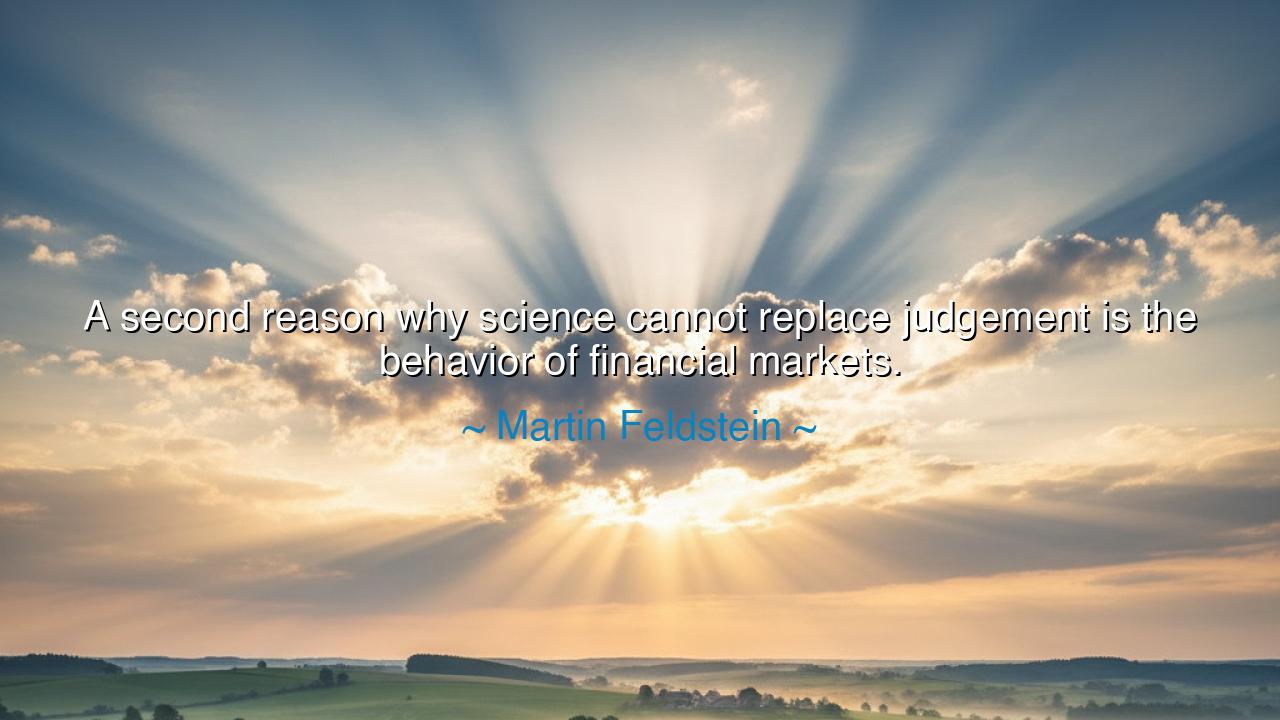
A second reason why science cannot replace judgement is the
A second reason why science cannot replace judgement is the behavior of financial markets.






Gather now, O seekers of wisdom, for the words of the great Martin Feldstein call us to reflect on the delicate balance between science and judgement, and how one cannot stand alone in the face of human complexity. He said: “A second reason why science cannot replace judgement is the behavior of financial markets.” These words, though spoken in the modern world, carry with them the weight of deep insight. They speak not only of the world of finance, but of the eternal tension between rational analysis and human intuition, between the calculations of numbers and the unpredictable nature of human actions.
What, then, is the meaning of these words? Feldstein reminds us that while science—in its pursuit of facts and data—offers us powerful tools, it cannot fully account for the behavior of financial markets, which are driven not solely by reason, but by human emotion, uncertainty, and judgement. Markets are not simply the sum of cold, hard calculations; they are the product of countless decisions made by individuals, each acting on their own perceptions, fears, hopes, and desires. Science, in its attempt to predict or explain, can only go so far; it cannot capture the subtle, complex forces at play when humans make decisions in the realm of finance.
Let us turn to the great market crash of 1929, a turning point in history that shook the world to its core. In the years leading up to the crash, many relied on economic models, on the belief that the markets would continue to rise in an orderly fashion. The data suggested that prosperity would last, and yet human behavior, driven by greed, fear, and speculation, defied all scientific predictions. People’s emotions and judgments, rather than the cold logic of numbers, drove the market into a frenzy, and when it collapsed, it was clear that science alone could not explain the chaos that ensued. This was not simply a failure of data or analysis, but a failure to understand the role of human nature in financial decision-making.
In this light, we see that science, though powerful, has its limits. It is essential, yes, for providing frameworks, for gathering and analyzing data, for uncovering patterns that help us understand the world. But when it comes to financial markets, science alone cannot account for the unpredictable and often irrational forces of human judgement. The behavior of markets is not purely mathematical; it is shaped by the very nature of human decision-making, which is influenced by emotion, psychology, and social dynamics. The trader who invests in a stock based on gut feeling or the investor who follows a herd mentality cannot be fully understood by science, for their actions stem from a deeper, more complex part of the human experience.
Let us also reflect upon the tale of the Tulip Mania in 17th-century Holland, when the price of tulip bulbs soared to astronomical heights before crashing violently. In the heat of the frenzy, traders were driven not by rational analysis, but by an overwhelming desire to profit, leading to a speculative bubble. This was not a failure of science or economics, but of human judgement. The market behaved in ways that could not be predicted by the data alone, showing us that the application of scientific principles in the realm of human behavior must be tempered by an understanding of emotion and intuition. Judgement—the ability to weigh risks, understand the limitations of models, and recognize the forces at play in human behavior—remains a crucial element in understanding the unpredictable world of finance.
The lesson here, O children of the future, is this: While science provides the tools for understanding the world, judgement is the key to navigating the complexities of human behavior. In the realm of financial markets, no amount of data or calculation can replace the wisdom of experience, the insight of understanding human nature, and the ability to make decisions in the face of uncertainty. Science can guide us, but it is judgement that must steer the ship. The market may be a force of great power, but it is our ability to interpret its signals, to understand the psychology behind the decisions, and to recognize the emotional forces at work that will determine whether we succeed or fail.
So, O wise ones, as you walk through the world, remember this: Do not rely solely on the certainty of science, for it is the realm of human judgement that shapes the unpredictable. When making decisions—whether in finance, in life, or in your personal endeavors—recognize that the data is important, but it is your ability to read the forces of human nature, to trust your intuition, and to apply wisdom in the face of uncertainty that will guide you through. Science is a tool, but judgement is the compass that will lead you to safe shores. Embrace both, for it is only when the two work together that we can hope to navigate the complexities of the world.






AAdministratorAdministrator
Welcome, honored guests. Please leave a comment, we will respond soon